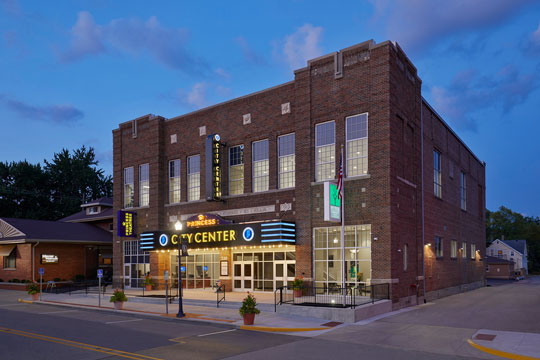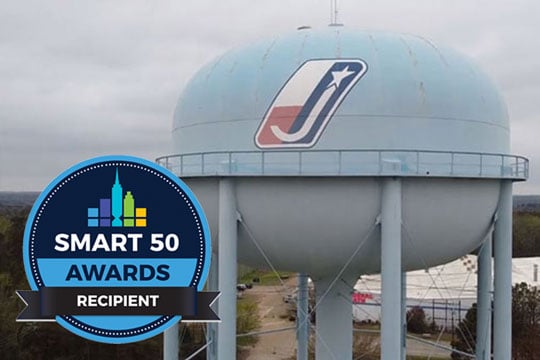City of Rushville, IN
Utilizing adaptive reuse, Performance Services transformed a century-old, historic building into a booming city center, that provides entertainment, education, and government efficiency opportunities.
City of Jacksonville, TX
The City implemented a performance contract with Performance Services to implement a smart water meter project that resulted in significant savings and the 2021 Smart 50 Award from Smart Cities Connect.
How We're Different.
- Solutions that respect limited budgets
- Owner control throughout the planning, design, and construction process
- Experts in creating high-performance buildings and systems with lower operating costs
- An in-house engineering team that listens intently
- Transparent, open-book pricing with Owner approved subcontractors
- A no change orders guarantee within the agreed to scope of work
- Enjoyable process and outcome that exceeds expectations
- 100% customer satisfaction commitment
Your Questions, Answered.
Yes, cities and towns of all sizes can benefit from smart technology. The beauty of this technology is there is no one model. Key components can be implemented singularly or in conjunction with others depending on city needs. For example, smart LED streetlights are a great first step in implementing smart infrastructure. They can provide a foundation from which other components can be added in the future.
Energy savings performance contracts are a more attractive procurement option than the traditional construction process, which requires low-bidder awards.
Our guaranteed energy savings contracts are self-funded and enable owners to choose best value products and equipment, including the selection of quality subcontractors. Building improvements can include products and services for HVAC systems and controls, lighting, windows, roofs, doors, plumbing, wastewater systems, life safety systems, and even renewable energy systems.
Over the last few years, especially during the pandemic, many cities and counties undertook updating their municipal master plan. In these plans, deferred maintenance was often left out or minimally addressed due to the need to address growth, economic development, and citizen services. Comprehensive facility assessments bridge those gaps between deferred maintenance and master plans and serve as the first step for clearing the maintenance backlog. This process can provide a “state of buildings” report that evaluates how facilities operate, identifies potential issues, and provides a blueprint for prioritizing repairs.
To address deferred maintenance, we help local governments first conduct comprehensive facility assessments that include:
-
Asset Inventory
-
Condition Assessment
-
Prioritization
-
Cost Estimation
-
Long-Term Planning
A comprehensive water meter replacement project not only benefits the water distribution system by creating a more efficient operation but allows a municipality to maintain the lowest possible water rates for clients. In general, smart water meter replacement projects can provide:
- More accurate water usage data: Newer water meters can provide real-time water consumption data to both the utility and clients.
- More accurate billing process: Hard water, debris, age, and deterioration can reduce the accuracy of analog meters over time, leading to lower measurements and the possibility of unbilled water use. With more precise meter readings, municipalities can bill more accurately.
- Increased revenue: Reducing the amount of unbilled water due to better distribution and more accurate meter readings can increase utility revenue.
- Reduced wear and tear: Real-time water consumption data can provide more proactive service in identifying and resolving issues and leaks.
We work with municipalities, using state-enabled legislation, to implement smart water solutions to become smart utilities with no up-front capital.
When funded through an energy savings performance contract, the entire smart water meter project — including high-quality equipment from top manufacturers — is fully funded from the savings garnered with new equipment. Increases in water meter efficiencies, reduction of operational costs, and elimination of future capital expenditures fund the project, which means your municipality need not invest any up-front capital.
Many states are facing water shortages. Extended droughts, as well as extreme weather patterns, including extreme temperatures, can stress water systems to their max. Water management is at the forefront of public concern.
Smart water meters provide the solutions that many cities and towns are seeking. Offering constant, real-time metering of water consumption data, along with features like water leak detection, smart meters can protect communities while optimizing water revenue, improving billing accuracy, and delivering more accurate water usage data.
A few examples of AMI integration with smart city initiatives include:
- Smart Grids
- Environmental Monitoring
- Waste Management
- Public Safety
- Environmental Sustainability
- Data Analytics and Visualization
- Urban Planning
- Resilience and Disaster Recovery
- Citizen Engagement
Contact our Team.
If you're interested in getting more from your next construction or renovation project, reach out to our team below. With an in-house team of experts in design and construction, we will assess your unique needs, listen to your goals, and design solutions that will benefit your municipality now and into the future.






